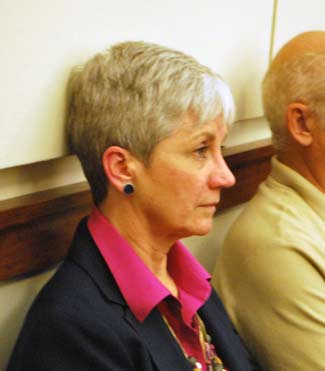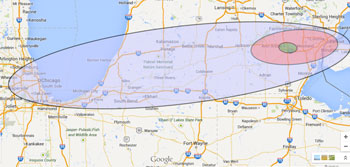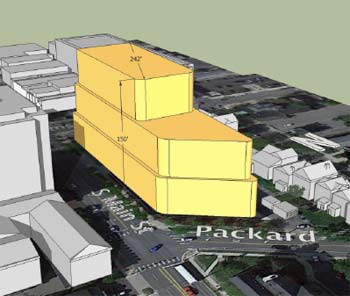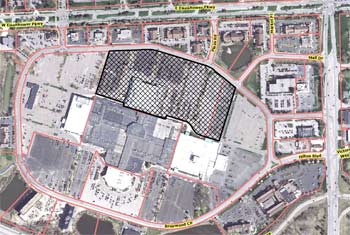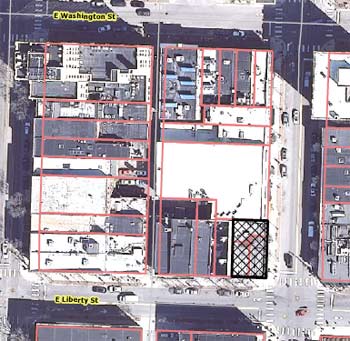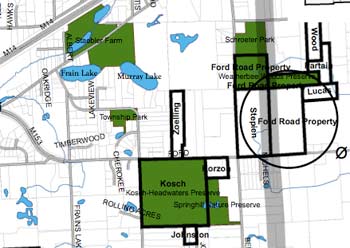Ann Arbor city council meeting (Oct. 7, 2013): The council’s meeting was bookended with the topic of mayoral appointments to boards and commissions – beginning with a confirmation vote that was not taken at all, and ending with a motion to reconsider a confirmation vote the council had taken at its previous meeting.
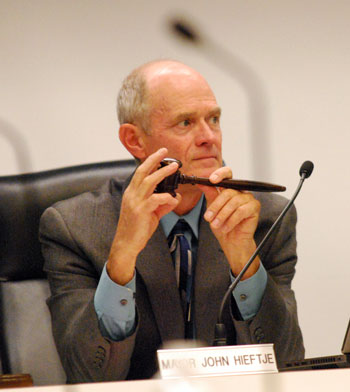
Mayor John Hieftje. There are 26 more regular city council meetings left in Hieftje’s mayoral tenure. He announced on Oct. 11 that he’s not planning to run for re-election in 2014. In an email sent to The Chronicle, he said the decision was made much earlier: “I made the decision over the summer on a kayak trip on the north east coast of Lake Superior.” (Photos by the writer.)
The confirmation vote that did not take place was on the appointment of Wayne Appleyard to the city’s energy commission. Although his nomination had been announced at the council’s Sept. 16 meeting, mayor John Hieftje did not move his name forward for a vote on Oct. 7. Appleyard’s appointment would have required a 7-vote majority under the city charter – because he’s not a city resident. With only eight councilmembers in attendance, his confirmation might not have received seven votes. A recent change to the council’s rules put the routine appointments – which the council approved unanimously – near the start of the meeting.
The confirmation vote that was moved for reconsideration at the end of the Oct. 7 meeting was that of Al McWilliams to the board of the Ann Arbor Downtown Development Authority. Midway through the meeting, the council had voted to direct the city attorney to write an opinion on the legal issues surrounding McWilliams’ appointment, which was made on a 6-5 vote at the council’s Sept. 16 meeting.
Under the council’s rules, McWilliams’ appointment appears to have required an 8-vote majority, because his nomination and confirmation came on the same night. That analysis relies on Hieftje’s statement at the council’s Sept. 3 meeting that on that occasion he was withdrawing McWilliams’ nomination. But because no objection to the apparent violation of the council’s rules was raised on Sept. 3, the city attorney’s opinion will likely just establish that a court challenge to the appointment could not be made.
A portion of the minutes of the council’s Sept. 16 meeting – relating to McWilliams’ appointment – was the topic of considerable back and forth, with approval of the minutes coming only after an amendment had been made to change the way some remarks made by Hieftje had been characterized.
The frustration of councilmembers on the losing side of the Sept. 16 vote was evident during deliberations – reflected in Mike Anglin’s (Ward 5) sole vote of dissent against the resolution directing the city attorney to write an opinion. Sumi Kailasapathy (Ward 1) also indicated dissatisfaction that the opinion resolution would not address the public’s interest in due process.
So a few minutes past midnight, after the council’s other business had been dispatched, Chuck Warpehoski (Ward 5) convinced his council colleagues to re-open the agenda for a motion to reconsider the vote on the appointment. Warpehoski had been on the prevailing side of the McWilliams’ confirmation vote. He then moved immediately for postponement until the Oct. 21 meeting and councilmembers supported that motion – so the council will take up the question of reconsideration at that time.
In other business, the council adopted an update to its solid waste plan, but not before amending the plan to remove mention of exploring the possibility of every-other-week trash pickup and pay-as-you-throw options in the future.
The council also considered two items related to hyper-local neighborhood infrastructure issues – cross-lot walkways and traffic calming projects.
Councilmembers gave initial approval to a change in the city’s sidewalk ordinance that would define certain walkways as “sidewalks.” The change will affect cross-lot walkways that connect streets with schools or parks, or streets with other streets. Defining these walkways as “sidewalks” allows them to be eligible for funds from the sidewalk repair millage, but does not trigger winter maintenance responsibility for adjacent property owners.
The council also approved a budget allocation of $55,000 to fund an additional two traffic calming (speed bump) projects this year. The same resolution directed the funding of three traffic calming projects next year.
Two site plans were approved by the council – one for a Tim Hortons drive-thru on Ann Arbor-Saline road, and another for a Belle Tire on Ellsworth.
A new schedule of liquor license fees was approved by the council. In some cases fees were lowered or eliminated, and in other cases they were raised – to reflect actual city costs in processing. For example, on-premise liquor license annual renewal fees were set at $90, an increase from $50, while fees for new liquor licenses were set at $600, a reduction from $2,500.
The council also approved a grant application to the Rockefeller Foundation for designating Ann Arbor as one of 100 Resilient Cities. While the total amount of funding for the program is identified as $100 million, according to the Rockefeller Foundation, that does not mean that each of the 100 cities would receive $1 million of support if selected. [Full Story]




